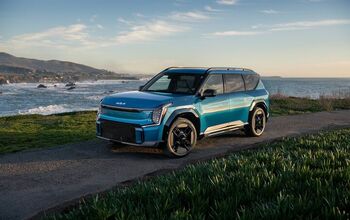Electric Alliance: Motors By Renault, Batteries By Daimler

Developing a new car with traditional technology costs an arm and a leg. Add future technology, and you are starting to talk real money. You need to spread the R&D costs across a lot of cars. The trouble is, massive sales of EVs are still just a dream. What to do in such a dicey situation? You look for partners. Renault and Daimler hammered out a new agreement. “Renault will supply the electric motors for the Smart and Twingo, we develop and make the batteries for both models,” Daimler’s head of research and development Thomas Weber told his hometown paper Stuttgarter Zeitung in an interview that will appear today in the print edition.
When Renault, Nissan and Daimler signed a three-way deal last April, batteries were not included. Each side thought they had the better one. Nissan has a Leaf, and what does Daimler have? Now they must have something. Daimler doesn’t want to rely entirely on Renault for the electric motors. They are talking with other suppliers, amongst them Bosch and Conti. “It is perceivable to sell the motors to other manufacturers,” said Weber, “in order to create more volume.”
Confused? You are not alone. Reuters got so lost in the fog of war when they wrote about the “battle for a foothold in the lucrative market for zero-emission vehicles” that they headlined their story with “Renault, BMW agree on Smart, Twingo supply deal.”

Bertel Schmitt comes back to journalism after taking a 35 year break in advertising and marketing. He ran and owned advertising agencies in Duesseldorf, Germany, and New York City. Volkswagen A.G. was Bertel's most important corporate account. Schmitt's advertising and marketing career touched many corners of the industry with a special focus on automotive products and services. Since 2004, he lives in Japan and China with his wife <a href="http://www.tomokoandbertel.com"> Tomoko </a>. Bertel Schmitt is a founding board member of the <a href="http://www.offshoresuperseries.com"> Offshore Super Series </a>, an American offshore powerboat racing organization. He is co-owner of the racing team Typhoon.
More by Bertel Schmitt

































Comments
Join the conversation
The electric motors will help reduce the cars emission levels resulting in a much cleaner and healthier environment for all. Fantastic idea.
You don’t get energy from nothing. There must be a source. Electric cars get their energy from either the electric grid or an IC engine. If gotten from the electric grid some process was used to make the electricity, like nuclear power or burning coal, oil or gas. A small, really small, percentage comes from other sources like solar. Most discussions about electric cars seem to ignore the pollution caused by creating the electric power to begin with. It isn’t clean power. We are deluding ourselves that electric cars are the future savior of the environment. Unless the electricity to charge the car is generated by solar power then there is pollution involved. When the MPG figures are calculated the cost for making the original electric power is not considered. Plug-in electric vehicles are not non-polluting. It’s just that the original power generating equipment is not in your backyard. Go watch a coal fired electricity generating plant. You’ll see the pollution all-electric cars generate.
The electrification of vehicles appears necessary, though fossile fuels will remain the most energy dense storage media for vehicle propulsion energy for many years to come, and certainly the most cost effective. The best batteries still weigh on the order of 50 times the energy equivalent amount of gasoline or diesel fuel. And they are expensive. Fuel cells - really just a more efficient form battery, though even more expensive- will likely be the future vehicle propulsion energy storage choice. The simple reality is that you can refill a hydrogen fueled vehicle tank about as quickly as your gas tank. Battery recharging will never approach that convenience. Today's battery electrics vehicles are setting the stage for fuel cell technology deployment when costs are brought down. Projections of well over 400,000,000 cars each in China and India, on top of the hundreds of millions already in use around the world make electrification necessary. All vehicles contribute only 1/8 of human carbon emissions, a miniscule 1/2 of 1% (.0045!!)of all carbon emissions, since 96.4% is natural. But, a fast growing global vehicle population will change the equation, whether you believe vehicles or even humans presently play much of a role in "climate change" or not. Geometric vehicle population growth will double and triple populations in the coming decades. Conflation of the pollution issues of just one means to generate electric power, fossile fuel, with the issue of vehicle emissions is inappropriate and obfuscates the issue of the vehicle itself. Power generation is a separate factor to be considered. We will always have electric power. If it is necessary to move to non-emitting sources, so be it. An electric car does not care where the power was generated, and it certainly takes the vehicle itself out of the emissions equation. The best batteries